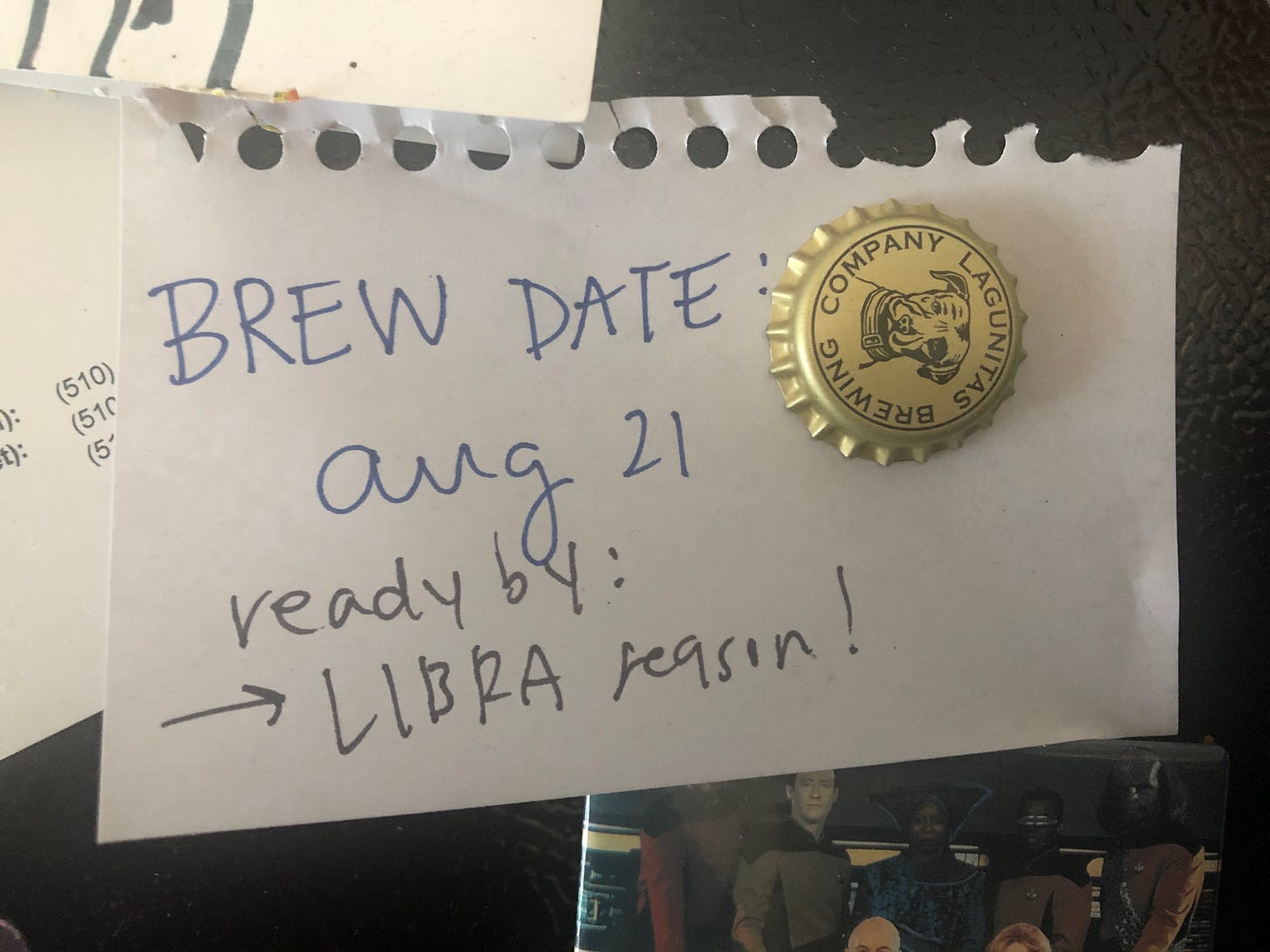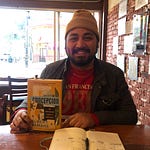
Heylo,
It’s been quite a while since Loitering last dropped… not that some significant loitering hasn’t happened since then. But as we all know, 2020 is the year where hustling doesn’t seem to make as much sense as it once did, given the broader forces, news, and circumstances around us. Life is exhausting! And sometimes, you need to just concentrate on holding the ice cream cone rather than adding more flavors to it (for more insight on that, please see the headline photo, taken in the late summer of 2018, and listen to the latest episode of Loitering with Evan, Adam, and Jesse Adam, featuring special guest co-producer Evan).
Meanwhile, while I did have a wonderful Loitering zoom session with Loitering’s “target audience” — also known as my friend Fonzie, also known as Mr. D :) — earlier this summer, and have an episode with Yashica Dutt, author of the book Coming Out As Dalit, that’s been in the works for a long time, both are TBD for now. Mr. D is an English teacher and Dean of students at a high school in the Bay Area, so our conversation about teaching and learning in the pandemic quickly became antiquated as the news cycle kept moving (we hope to re-Loiter later this fall). And sadly, just as I was going through final edits of my interview with Yashica, my audio file (and its backup files!) corrupted. :( Then I just got wrapped up with work, particularly a story for which I first interviewed Yashica last year.
To make a long story short, the delays around that story (which, to be clear, is now a different story on the same topic) have very much to do with inequities in our media industry, discussions which inflamed as the Black Lives Matter protests became the largest movement in American history. Twitter has especially become the hotspot for journalists to vent about their struggles, and for a while this summer, it felt like the trauma and frustrations associated with being a journalist or producer of color in American media was surrounding me too much — even as I was also trying to figure out the best way to navigate my own experiences.
So rather than hoping for retweets that might give me a false impression of validation and closure, I opted to make it very clear (once again) in emails and subsequent phone calls to the place where a certain experience of mine did transpire — and man, talk about exhausting. 2020 has been a year of reckoning for everyone. While the media industry seems sincere in trying to circumvent its lack of diversity when it comes to coverage and who is in the position to shape and report such stories, with the way journalism economics is going, it also just feels… late. And, therefore, a more extractive process at times for a person like me. Is the journalism industry going to stop laying off reporters? Will they stop tightening their freelance budgets and instead maybe consider hiring one of these freelancers full-time, or at least offer them the chance to do expensive, deep-dive reporting? Probably not, at least not to those first few questions. It’s difficult to not then sometimes feel like a guinea pig for how XX organization can do better when they want to have these phone calls. The other party’s well-meaning can only mean something when actual action is the result.
And in this environment, some full-time staffers at news organizations have opted to leave their jobs and create their own individual subscription news coverage on this platform you’re reading right now. This is a trend I’ve been following for a while, with both curiosity and trepidation. Most news coverage on this focuses on staffers who are choosing to go independent, rather than independents who have maybe fallen into that model for other reasons. My current feelings on this trend center on observations that the folks Substack is recruiting to be star independents — a sort of “journalism influencer” — are people who, at their media companies beforehand, were the ones who were actually encouraged and validated for their contributions, and given the chance to do the deep reporting for which they became known. So when it comes to “fixing” a crisis in news coverage, there’s still a huge gaping hole about the problems journalists of color have been venting about all along. I am sure there are exceptions to this, and I would love to discuss this further and be proven wrong since I do think Substack is doing something interesting. But these are some of my current thoughts.
That being said, I am not too proud to hold back in asking you, if you are not already a subscriber, to now subscribe. :)
On an entirely different note, we are officially in Libra season, if that means anything to you. While I am not necessarily in the cohort of millennials turning to astrology as the main framework for understanding life, I will admit I look forward to seeing what Susan Miller has in store for me every month and try to imagine how it will or won’t make sense. But this year, I am excited about Libra season mostly because it signifies something else in my house: kombucha.
Let’s backtrack to June, when I saw this email on a local Bay Area listserve I’m on.

OBVIOUSLY, this captured my interest. Jun scoby, ey? I got in touch with the email poster, a man named Marcus. But it turned out I would be far down the list of others who got in touch with him before me. Upon learning about this, I mentioned it was ok, no worries because I’m not that hardcore. Then it turned into this other exchange, where I learned a bit about comparative resilience.

I was a bit overwhelmed at the information and had to explain myself.

Marcus got back to me the very next day. He was excited. He suggested that since kombucha scobies are a bit more resilient — albeit take more time to brew — it might be a better option for someone starting out. So low and behold, some weeks later, I walked over to meet Marcus at a safe social distance and came back with a scoby. He also gave me an entire rundown about how to brew kombucha and was so excellent at it that — with his permission — I am now sharing this presentation with you here.
Marcus and I live in the same neighborhood, and as I walked back with this scoby specimen, a few people eyed it (and me) warily. It really did look disgusting.
Then me, being the tired and busy and burnt out person I am, let the scoby sit for a while instead of brewing up some kombucha right away. It was only thanks to my housemate, who has experience in the kombucha department, that we finally got things going. Here is a brief illustration of what transpired that COVID Friday night.

We wrote a note to ourselves on the ready date.

We will let you know how it turned out.
Some links:
Here’s a story that keeps running through my mind, and a podcast interview with the writer of that story, which I similarly can’t stop thinking about. The podcast interview with the writer, Jiayang Fan, vocalizes the depths of conversations I personally wish we had more of — around what it means to create stories and create the self.
Speaking of seeing the self, Yashica Dutt wrote this review of Isabel Wilkerson’s new book Caste that — especially if you’re interested in caste and the implications of that book — you should read.
The children born on 9/11 are about to vote, which makes you wonder about what it must be like to grow up with your life defined by tragedy (also, Sabrina Toppa pointed out that the focus group didn’t include any Muslim or Arab kids born on 9/11, which would more than likely reveal realities and experiences someone like Paul Krugman also seems oblivious to).
I hope you’re listening to the new iteration of The Cut Podcast.
Today’s news adds to the collective burden so many communities — but particularly Black communities — are facing. These two episodes of The Daily about Breonna Taylor and what transpired the night police killed her are worth listening to. Here’s Part 1, here’s Part 2, and here’s a newsletter about the reporter and producers’ process.
This piece about why we’re not mourning the 200,000+ people who have died from COVID-19 is a sad but necessary read. This line in particular drives it home: “Properly mourning and memorializing the dead would require a national reckoning with how government at every level mishandled the pandemic, how the US failed so much in contrast to other countries, and how structural inequalities made the virus much deadlier for Black and Latinx Americans.”
My mini beat is pretty relevant this year. Here’s a recent piece I reported that was co-published in The Guardian and The Juggernaut.
I have a couple of stories I’ve been working on for a long time coming out soon too, so I hope to send another Loitering update sooner rather than later!
P.S. Don’t forget to register to vote.
P.P.S. Don’t forget to get a flu shot either.
I’d love feedback, or just to hear from you, so please feel free to get in touch. And if you know someone you think may like to read or listen to Loitering, please share. Thank you.










